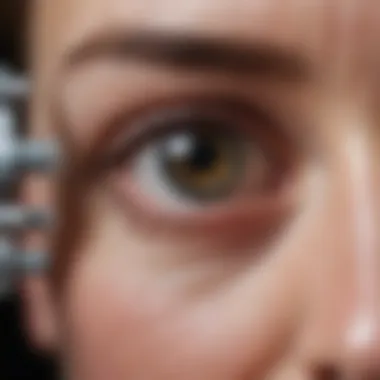Comprehensive Overview of Spectrum Eye Care in Eldridge


Intro
Eye health is a critical aspect of overall well-being. The significance of eye care facilities cannot be understated, especially given the increasing prevalence of eye conditions. Spectrum Eye Care in Eldridge specialize in delivering personalized and advanced eye care solutions. In this article, we will delve into their service offerings, the technology they employ, and their approach to patient care. This comprehensive overview aims to inform both prospective patients and those keen on understanding the broader field of eye health.
Research Background
Overview of the Scientific Problem Addressed
The increasing rates of vision impairment and eye diseases highlight the urgency for effective eye care. Conditions like myopia, hyperopia, and glaucoma affect millions, often leading to irreversible damage if not addressed timely. This article provides insights into how specialized facilities like Spectrum Eye Care address these challenges through various services and preventive care measures.
Historical Context and Previous Studies
Historically, advancements in eye care have evolved from basic methods to highly sophisticated techniques. Previous studies published in journals like the American Journal of Ophthalmology show a clear correlation between regular eye exams and improved outcomes in managing eye diseases. Well-established practices and new technologies have contributed to a shift towards more proactive eye health management.
Services Offered
Spectrum Eye Care offers a comprehensive range of services including:
- Comprehensive Eye Examinations: Routine exams are essential for detecting any potential issues early.
- Contact Lens Fitting: Experts aid patients in selecting the right type of lenses based on lifestyle and eye health.
- Pediatric Eye Care: Early assessment is vital for children to prevent long-term vision issues.
- Surgical Options: Specialized surgeries for conditions like cataracts or refractive errors are available.
Technological Advancements
The implementation of technology in eye care has revolutionized patient diagnosis and treatment. Spectrum Eye Care uses advanced diagnostic equipment such as:
- Digital Retinal Imaging: This provides a detailed view of the retina and can help in detecting diseases early.
- Optical Coherence Tomography (OCT): This non-invasive imaging technique aids in assessing the retina's layers, providing context for conditions like macular degeneration.
Patient Care Philosophy
The foundation of Spectrum Eye Care's approach is centered on patient care. Their philosophy focuses on providing customized treatments and fostering an environment where patients feel valued and empowered. The emphasis on timely communication ensures that patients are informed about their conditions and the necessary steps towards treatment.
Importance of Regular Eye Exams
The correlation between regular eye exams and maintaining eye health cannot be overlooked. Experts recommend that individuals have their eyes checked at least once a year, or more frequently based on specific eye health needs. Early detection through routine exams can prevent complications and promote better overall eye health.
"Regular eye exams are a key component in safeguarding vision and enhancing quality of life."
End
In summary, Spectrum Eye Care in Eldridge stands as a beacon in eye health management. Through their comprehensive services, technological advancements, and an unwavering commitment to patient care, they exemplify the importance of specialized eye care facilities. Understanding and prioritizing eye health is essential for a better quality of life, and facilities like Spectrum Eye Care play a pivotal role in achieving that goal.
Preamble to Spectrum Eye Care
Understanding the significance of Spectrum Eye Care in Eldridge is crucial for anyone interested in maintaining optimal eye health. This facility serves as a crucial resource for the community, providing a wide array of services tailored to individual needs. The importance of regular eye care cannot be overstated, as it plays an essential role in preventing vision problems and diagnosing potential issues early. The article aims to present a comprehensive overview of what this establishment has to offer, including its history, mission, and the cutting-edge services provided.
Historical Background
Spectrum Eye Care has a rich history shaped by dedication to eye health and patient satisfaction. Founded in Eldridge, the practice was established with the goal of becoming a trusted provider of vision-related services. Over the years, it has expanded its offerings and embraced technological innovations to ensure its patients receive the highest standard of care. The commitment to making eye care accessible has been a driving force in its operations.
Mission and Vision
The mission of Spectrum Eye Care is clear: to enhance the quality of life for its patients through exceptional eye care. This vision extends beyond mere treatment; it encompasses educational initiatives aimed at empowering patients with knowledge about their eye health. By focusing on personalized care, the practice ensures that each patient receives tailored treatment plans that address unique needs and lifestyles. Through collaboration and community engagement, Spectrum Eye Care aspires to be a leader in eye health advocacy, making long-term improvements in patient outcomes.
Services Offered
The section on services offered is crucial in providing a thorough understanding of what patients can expect at Spectrum Eye Care in Eldridge. It dives into the various services tailored to meet diverse eye health needs. Each service is designed with patient care as a priority, ensuring the best outcomes possible. Understanding these services allows prospective patients to make informed decisions about their eye care.
Comprehensive Eye Exams
Comprehensive eye exams at Spectrum Eye Care are fundamental to maintaining ocular health. These evaluations are more than just a prescription for glasses or contact lenses. They involve detailed assessments of the eye's structure and function. An experienced optometrist conducts a series of tests to check for any signs of eye diseases such as glaucoma, cataracts, or macular degeneration. Regular exams can help detect issues early, leading to effective treatment and better long-term outcomes. This proactive approach emphasizes not only vision correction but overall eye wellness.
Contact Lens Fitting


Contact lens fitting is a specialized service that ensures the lenses align perfectly with the individual patient's needs. This fitting process involves measuring the curvature of the cornea and the size of the eye. The staff at Spectrum Eye Care evaluates each patient’s unique features to recommend the best type of lenses. Proper fitting is essential to avoid discomfort or complications. It also ensures optimal vision correction. Patients transitioning from glasses to contacts often report increased convenience and enhanced peripheral vision.
Pediatric Eye Care
Pediatric eye care addresses the specific requirements of infants, children, and adolescents. Early detection of vision problems in youth is critical, as it can significantly impact learning and development. The staff at Spectrum Eye Care is trained to engage young patients in a way that makes their experience less daunting. Comprehensive eye exams for children can detect conditions like amblyopia or refractive errors early. Formulating a treatment plan tailored to a child's needs can help ensure healthy vision well into adulthood.
Surgical Procedures
Surgical procedures at Spectrum Eye Care encompass a range of interventions aimed at correcting various eye conditions. Common surgeries include cataract removal, LASIK eye surgery, and procedures for refractive issues. Such surgeries are performed by qualified ophthalmologists who possess extensive expertise. The clinic prides itself on using state-of-the-art technology to enhance patient safety and efficiency. Thorough pre-operative and post-operative care are integral to the surgical process, ensuring that patients have the best chance at a successful recovery.
"Regular eye exams and timely treatments are key to preserving vision and maintaining eye health across all ages."
Overall, the services offered at Spectrum Eye Care combine cutting-edge technology with a personal touch. Each service is tailored to support optimal eye health for every patient.
Technological Advancements in Eye Care
Technological advancements play a crucial role in modern eye care. They enhance diagnostic accuracy, treatment efficacy, and patient outcomes. As the field of ophthalmology evolves, adopting new technologies becomes essential. These innovations not only improve routine eye exams but also offer solutions to complex vision problems. Understanding these advancements can inform patients and practitioners about the potential benefits.
Diagnostic Equipment
Diagnostic equipment has significantly improved the way eye conditions are assessed and diagnosed. Devices like optical coherence tomography (OCT) allow for high-resolution imaging of the retina. This gives eye care professionals a detailed view of the eye's internal structures. Such clarity helps in detecting conditions like macular degeneration or diabetic retinopathy at early stages, which is critical for effective treatment.
Other tools like automated perimeters assist in testing visual fields accurately. With this technology, specialists can monitor glaucoma and other optic nerve problems more effectively.
"Early detection of eye diseases is vital. Advanced diagnostic tools can catch issues before they become serious, thus preserving vision for many patients."
Treatment Technologies
In addition to diagnostic advancements, treatment technologies have also made significant strides. For instance, laser treatments have revolutionized procedures for correcting refractive errors such as nearsightedness and farsightedness. LASIK, or laser-assisted in situ keratomileusis, has become a common option for those seeking freedom from glasses or contact lenses. The precision of laser technology minimizes risks and enhances recovery times.
Furthermore, new drug delivery systems are improving the way treatments are administered for chronic eye conditions. Sustained-release implants and intravitreal injections are becoming standard, allowing for more effective management of diseases like age-related macular degeneration.
As advancements continue, eye care becomes more efficient, accurate, and patient-centered. Embracing these technologies allows for better health outcomes and improved quality of life for individuals suffering from vision issues.
Patient Care Philosophy
The concept of patient care philosophy forms the backbone of any healthcare institution, and Spectrum Eye Care in Eldridge exemplifies this idea well. At its core, patient care philosophy emphasizes a holistic approach to treatment, considering not just the physical aspects of eye health, but also the emotional and psychological needs of patients. In an era where healthcare can feel impersonal, Spectrum Eye Care strives to create a welcoming environment where patients feel seen and heard. This approach has significant benefits, as it fosters trust and comfort, encouraging patients to engage more actively in their treatment plans.
Personalized Treatment Plans
Personalized treatment plans are a fundamental component of the patient care philosophy at Spectrum Eye Care. Each patient is unique, bringing their own medical history and specific visual needs. Therefore, instead of a one-size-fits-all strategy, the facility emphasizes tailored solutions.
- This customization starts from the initial consultation, where comprehensive eye exams identify individual conditions and preferences.
- Based on these findings, the healthcare professionals at Spectrum Eye Care craft treatment plans that align with personal goals, ensuring that every aspect of the patient’s eye care journey is addressed.
- Regular follow-ups also play a critical role in this personalized approach, allowing for adjustments to treatments as necessary.
This level of customization not only improves the effectiveness of treatments but also enhances patient satisfaction and health outcomes.
Patient Education Initiatives
Education is a pillar of the patient care philosophy at Spectrum Eye Care. The facility recognizes that informed patients are better equipped to make decisions regarding their eye health. Educational initiatives encompass various strategies tailored to different age groups and demographics.
- Workshops and Seminars: Regular sessions provide vital information about eye health, common conditions, and preventative measures.
- Online Resources: The website offers easy access to articles, videos, and FAQs to help patients learn more about their conditions and treatments.
- Guided Discussions: During appointments, eye care professionals take the time to explain diagnoses and treatment options, encouraging patients to ask questions and discuss any concerns they may have.
"Knowledge is empowering; it enables patients to take control of their eye health effectively."
Through these initiatives, Spectrum Eye Care fosters an environment where patients feel more engaged in their own care, which contributes to better health decisions and adherence to treatment protocols.
In summary, the patient care philosophy at Spectrum Eye Care in Eldridge emphasizes the need for personalized treatment and education, which are essential in enhancing overall patient experience and healthcare outcomes.
The Importance of Regular Eye Exams
Regular eye exams are an essential aspect of maintaining overall health and well-being. This section will explore the significance of these exams, the recommended frequency for check-ups, and the potential issues that can be detected through routine assessments. Understanding these elements can help individuals prioritize their eye health and make informed decisions regarding their vision care.


Frequency of Eye Check-ups
Frequency of eye check-ups depends on several factors, including age, medical history, and existing vision problems. Generally, adults should have an eye exam at least once every two years. However, this interval may increase to every year for those over 60 or individuals with conditions such as diabetes or glaucoma. Children should also receive comprehensive eye screenings as they grow, usually starting around six months of age and again before they enter school. Regular exams can help ensure that any changes in vision are addressed promptly, aiding in the prevention of further complications.
Potential Issues Detected
Routine eye exams can identify various potential issues before they become severe. The following conditions may be detected during an examination:
- Refractive errors: These are common vision problems like nearsightedness, farsightedness, and astigmatism.
- Cataracts: This clouding of the lens can occur with age and result in blurred vision.
- Glaucoma: High pressure within the eye can lead to optic nerve damage and vision loss if not managed.
- Diabetic retinopathy: A condition affecting those with diabetes, which can lead to blindness if not treated.
- Macular degeneration: This age-related condition can cause central vision loss and is often detected in regular check-ups.
"The best way to protect your vision is through preventive care and regular eye exams."
By catching these issues early, individuals can work with their eye care providers at Spectrum Eye Care in Eldridge to implement appropriate treatment strategies. The proactive approach offered by regular eye check-ups significantly contributes to sustained eye health and, by extension, overall quality of life.
Understanding Vision Problems
Vision problems affect many people and understanding these issues is crucial for effective treatment and management. This section emphasizes the significance of recognizing common vision problems and their impact on daily life. Early detection can lead to better outcomes, reducing complications that may arise from untreated conditions. Furthermore, an informed approach to vision issues enables patients to make knowledgeable decisions regarding their eye care.
Common Conditions Treated
Spectrum Eye Care offers services for various eye conditions. Common conditions include:
- Myopia (Nearsightedness): Difficulty seeing distant objects clearly.
- Hyperopia (Farsightedness): Challenges with viewing close objects.
- Astigmatism: Distortion or blurriness caused by an irregular curvature of the eye.
- Presbyopia: Age-related difficulty in focusing on close-up tasks, such as reading.
- Cataracts: Clouding of the lens, leading to blurred vision or difficulties with night vision.
- Glaucoma: Increased pressure in the eye that can lead to optic nerve damage and vision loss.
These conditions, among others, are commonly addressed at Spectrum Eye Care. The specialists are trained to provide accurate diagnoses and recommend appropriate treatment options.
Preventative Care Strategies
Preventative care is vital for maintaining eye health, and Spectrum Eye Care employs various strategies to help patients avoid serious vision problems. Key strategies include:
- Regular Eye Exams: Scheduling comprehensive exams annually can identify problems early.
- Healthy Lifestyle Choices: Eating a balanced diet rich in vitamins A, C, and E supports eye health.
- Protective Eyewear: Using sunglasses that block UV light to prevent damage.
- Limit Screen Time: Taking breaks from screens to reduce digital eye strain.
- Manage Systematic Health: Conditions such as diabetes can impact vision, requiring attentive management.
"Regular check-ups can nip vision issues in the bud before they escalate into significant problems."
By adopting these preventative measures, individuals can safeguard their vision and reduce the risk of common eye conditions. Understanding vision problems not only fosters awareness but also emphasizes the importance of ongoing eye care, making it an integral focus of patient education at Spectrum Eye Care.
Patient Testimonials
Patient testimonials hold essential value in the realm of health care, particularly in eye care services like those provided by Spectrum Eye Care. They serve several purposes and provide insights that go beyond the clinical results.
Firstly, testimonials offer a personal perspective on the quality of care received. Individuals who have undergone treatments or procedures often share their experiences. These narratives can illustrate the effectiveness of specific treatments, the professionalism of the staff, and the overall atmosphere of the facility. By revealing genuine patient accounts, prospective patients can build trust in the services offered.
Furthermore, testimonials highlight the emotional aspect of patient experiences. Eye care can be sensitive and impactful, affecting daily life significantly. Stories of individuals overcoming vision problems can inspire confidence. They may show how Spectrum Eye Care has played a monumental role in restoring or improving their vision, leading to better quality of life. This emotional connection is a powerful motivator for new patients considering care.
Key elements of patient testimonials include:
- Authenticity: Real stories resonate more than statistics.
- Diversity of Experiences: Different patients can speak on various procedures and treatments, reflecting the comprehensive services offered.
- Feedback Loop: Satisfaction levels highlighted in testimonials can lead to improvements in service, as any concerns can be identified by the practice.
- Community Trust: Positive feedback contributes to a reputation that fosters trust within the community.
Success Stories
Success stories recount the positive outcomes patients have achieved through treatment at Spectrum Eye Care. These tales often emphasize transformative experiences where patients overcame significant vision challenges or adapted to new corrective solutions, such as contact lenses or surgical interventions.
For instance, a patient may share their journey from struggling with severe refractive errors to enjoying an active lifestyle without the encumbrance of glasses. Such narratives not only spotlight the technical prowess of the facility but also illustrate personal victories that resonate with potential clients.
Patient Satisfaction Ratings
Patient satisfaction ratings provide quantifiable evidence of the quality of care at Spectrum Eye Care. These ratings often reflect various aspects of the patient's experience, including wait times, staff interaction, and overall satisfaction with treatments received. High satisfaction ratings are pivotal, as they validate the effectiveness of both medical and customer service efforts.
Evaluating patient satisfaction can be done through surveys or feedback forms, allowing the practice to identify areas of excellence and opportunity. Regularly monitoring these ratings ensures a continuous improvement cycle and fosters a patient-first philosophy. This engagement serves not only to reassure current patients but also to attract new individuals seeking quality eye care services.
Community Involvement


Community involvement is a crucial aspect of any health facility, including Spectrum Eye Care in Eldridge. This concept emphasizes the role of local organizations and campaigns in promoting eye health awareness. The engagement with the community fosters a culture of health, education, and support. It extends the reach of their services and ensures that residents are informed about eye care.
Spectrum Eye Care organizes and participates in various initiatives aimed at enhancing community awareness around eye health issues. Through proactive engagement, they not only serve individual patients but also contribute to a healthier population overall. When professionals collaborate with community organizations, they can create tailored programs that address local needs, ultimately leading to better eye care outcomes.
Local Vision Awareness Campaigns
Local vision awareness campaigns represent a vital part of the strategy at Spectrum Eye Care. These campaigns are designed to educate the community about the importance of eye health. By focusing on preventive measures, they can highlight how regular check-ups can significantly reduce the risk of eye-related diseases.
The campaigns may include workshops, health fairs, and educational sessions at schools and community centers. The goal is to reach diverse audiences, from children to seniors, ensuring everyone understands how to care for their eyes. Creating materials that are easy to comprehend helps reinforce these messages effectively.
Additionally, promotional activities may leverage social media platforms such as
Facebook to raise awareness, sharing testimonials and engaging content. These actions increase visibility and build trust within the community.
Partnerships with Local Organizations
Building partnerships with local organizations enhances the impact of Spectrum Eye Care’s initiatives. Collaborating with non-profits, schools, and health departments allows for more cohesive and effective outreach. These partnerships facilitate the sharing of resources, expertise, and networks, amplifying the overall message of eye health.
For example, partnering with schools can lead to vision screenings for children, identifying issues early on. Collaborations also ensure that information on eye health is disseminated widely within the community. As a result, the dialogue surrounding eye care continues beyond the office doors of Spectrum Eye Care.
The mutual support between Spectrum Eye Care and local organizations fosters trust and community resilience. The partnerships create opportunities for shared events that can further engage residents in eye health initiatives.
"Community involvement strengthens the capability of healthcare providers to address local needs effectively. It creates a support system where education and care go hand in hand."
Insurance and Payment Options
The consideration of insurance and payment options is crucial for those seeking eye care services. Understanding the types of insurances accepted and the available financing options can alleviate financial stress for patients and ensure access to necessary treatment. This section discusses these aspects in detail, outlining how they contribute to the overall experience at Spectrum Eye Care in Eldridge.
Accepted Insurance Plans
Spectrum Eye Care proudly accepts various insurance plans, which helps to broaden access to their services. Some of the notable insurance providers include:
- Aetna
- Blue Cross Blue Shield
- Cigna
- United Healthcare
These partnerships enable patients to receive covered services without excessive out-of-pocket expenses. Each plan typically has different coverage levels for specific procedures, such as eye exams, contact lens fittings, and surgical services. Thus, it is advisable for patients to verify their plan's coverage beforehand. This verification helps to avoid unexpected costs and ensures patients can budget effectively for their eye care needs.
Financing Options Available
For individuals without insurance or those whose plans do not fully cover eye care services, financing options provide an alternative. Spectrum Eye Care offers several financing solutions to assist patients in managing their expenses. Some options include:
- Monthly payment plans to spread costs over time
- Flexible spending accounts that allow users to pay for care with pre-tax income
- Special financing promotions on certain treatments or services
Utilizing these financing options can make necessary eye care procedures more accessible. They offer convenience and flexibility while lowering the financial barriers that sometimes accompany health care. Prospective patients should inquire about these options during their initial consultation to find solutions that suit their needs.
"Understanding your insurance and payment options can play a significant role in your eye health journey. Knowledge empowers patients to make informed decisions about their care."
In summary, clarity regarding insurance acceptance alongside viable financing options stands as a pillar of patient-centered care in Spectrum Eye Care. It fosters a supportive environment where financial considerations do not hinder access to essential eye care.
Future Directions in Eye Care
The field of eye care is constantly evolving, driven by technological advancements and new treatment methodologies. Looking ahead to future directions in eye care, we can expect significant changes that promise to enhance patient experience and health outcomes. This section emphasizes emerging treatments and the role of research initiatives, which are critical in maintaining the momentum of innovation in eye care practices. The importance of these advancements cannot be overstated, as they not only improve treatment efficacy but also contribute to overall public health awareness regarding vision care.
Emerging Treatments
Emerging treatments in eye care often focus on both innovative technologies and novel therapeutic approaches. One significant area of development includes the growing use of gene therapy for inherited retinal diseases. With advancements in genetic sequencing and targeted treatments, patients may have access to therapies that can potentially reverse or mitigate the impact of certain genetic conditions.
Another noteworthy trend involves personalized medicine, which tailors treatment plans to the individual characteristics of each patient. By utilizing data analytics and artificial intelligence, eye care professionals can craft more effective and precise interventions. This approach fosters an understanding of patient-specific responses to treatments, allowing for more refined methods in managing conditions such as glaucoma or macular degeneration.
Furthermore, minimally invasive surgeries are becoming more prevalent. Techniques that reduce recovery time and post-operative complications are in demand. For instance, laser-assisted procedures are now widely recognized for their efficiency in treating refractive errors. As these treatments gain acceptance, we anticipate broader implementation in clinical settings, benefitting a larger patient population.
"The integration of innovative treatments and patient-centric methodologies holds the promise of not just enhancing vision but fundamentally improving quality of life."
Research Initiatives
Research initiatives play a critical role in shaping the future of eye care. Continuous investigations into disease pathophysiology can lead to breakthroughs in treatment options. For example, studies exploring the relationship between systemic health conditions, such as diabetes, and their effect on eye health are crucial. Insights from such research can aid in the development of prevention programs focusing on at-risk populations.
Collaborative efforts between academic institutions and healthcare facilities also bring about innovative solutions. By pooling resources and expertise, stakeholders can tackle complex eye diseases more effectively. These partnerships may enhance clinical trials, providing a pathway for promising new treatments to reach patients more rapidly.
In addition, technology integration within research processes is vital. Data mining and machine learning techniques are being applied to predict treatment outcomes and identify trends in patient behavior. This information is invaluable for clinicians, enabling them to make informed decisions tailored to individual patient needs.
In summary, the future of eye care stands on the shoulders of emerging treatments and dedicated research initiatives. As we move forward, these elements will not only improve clinical practices but also elevate the standards of care provided to patients at Spectrum Eye Care in Eldridge and beyond.







